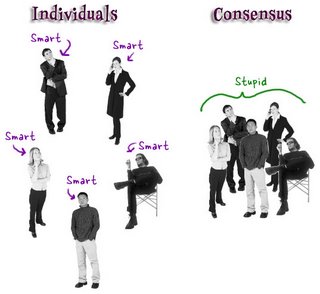
Literature circles work under the concept that "None of us is smarter than all of us". Like many utopias, that ideal is good on paper. Collaboration cannot be bad, right? In our very collaborative world of technology where the computer not only allows you to be a consumer but encourages you to be a producer (blogs, wikipedia, web pages), is that always true?
I am an avid reader of a blog called Creating Passionate Users written by several authors. The most prolific writer on that blog, Kathy Sierra-game developer and software creator, wrote something very profound which reflected on her experience at a conference where she heard James Surowiecki, author of The Wisdom of Crowds. Kathy writes that she believes that groups are collectively dumber than individuals (see her creative image on this post). Read her post and then reflect on your thoughts about "groupwork":
He started with a few thoughts on how ants (and so many other creatures) are quite simple and stupid, but that their intelligence and complexity grows with the number of interactions between them. More ant interaction equals more sophisticated behavior. It's similar to flocking behavior, of course, where birds follow very simple rules but complex behavior emerges.
And that's all great and intuitive... until you get to humans. Humans, he said, demonstrate the opposite principle: more interactions equals dumber behavior. When we come together and interact as a group seeking consensus, we lose sophistication and intelligence. Ants get smarter while we get dumber.
So how does this track with the name of his book?
Where I had it wrong is that his book's premise (wisdom of crowds) comes with qualifiers.
The wisdom of crowds comes not from the consensus decision of the group, but from the aggregation of the ideas/thoughts/decisions of each individual in the group.
At its simplest form, it means that if you take a bunch of people and ask them (as individuals) to answer a question, the average of each of those individual answers will likely be better than if the group works together to come up with a single answer. And he has a ton of real examples (but you'll just have to read the book for them ; )
4 comments:
i think working in groups can be very beneficial because you dont feel as necessarily burdened by the amount of work, plus you can blend ideas with your peers. im really excited about working in groups on this reading project. it should be fun.
Working in groups can be a good thing, but it can also be a very annoying thing. If you have a good group of people that are willing to help and do their part, then group work can be a great experience, however, if you do not have a good group of people, the experience will not be a fun one. Also, sometimes when people get together to work, they get off task really easily and do not get any work done.
It isn't always the most qualified individuals that make a productive team. It is how all of them collaborate once in the group that measures the success of the team. In a team there should always be a leader, followers, and someone that steps out of the box to question what's going on. That creates a well balance for everyone. In either scenario entrepreneurs vs. corporation in business today every individual needs to learn how to cooperate in both settings.
In many situations groups can be better. For example, the presidents of America have always had cabinets to help them make decisions. They get to hear knowledge and ideas from many people (all the current secretaries of everything I could name right now.....because I have Ms. Isbell, yay). On the other hand, if you maused a group to decide which restaurant to go eat at, it is hopeless. In my opinion, groups are best when all of the participants are qualified and that there is a leader and overall decision maker. Groups should only be used for very dificult or complex things in which you need all the different opinions, wisdom, experiences, and options you can. If it is over something easy or simple, groups only hurt.
Post a Comment